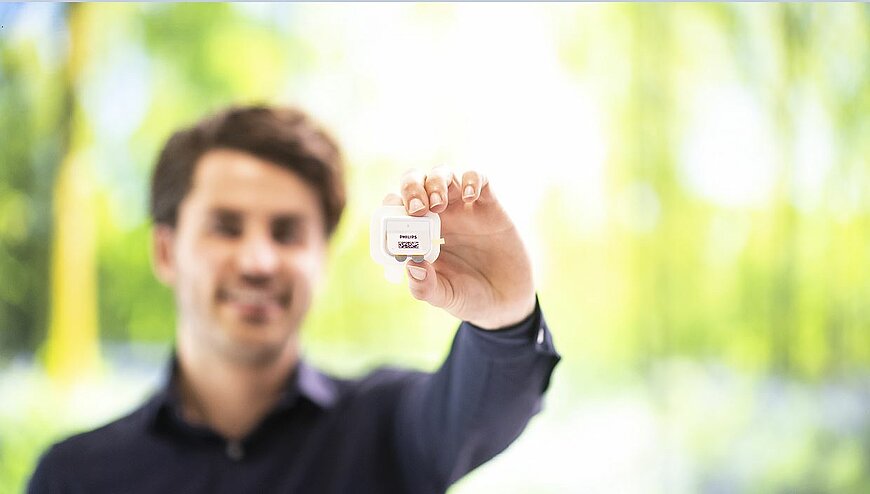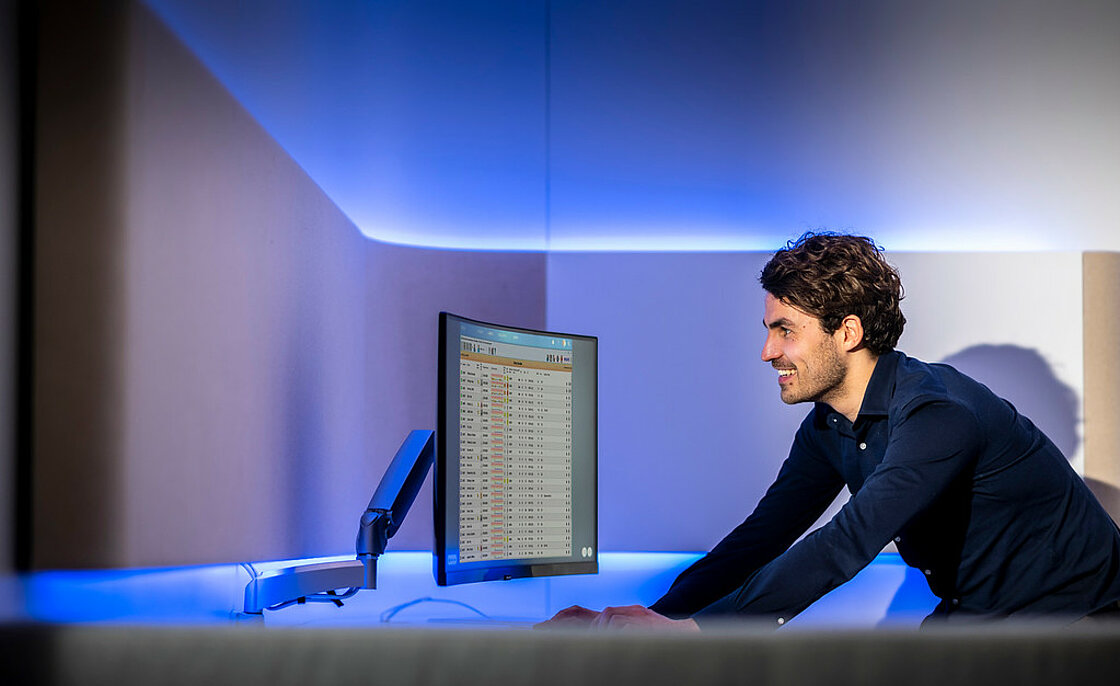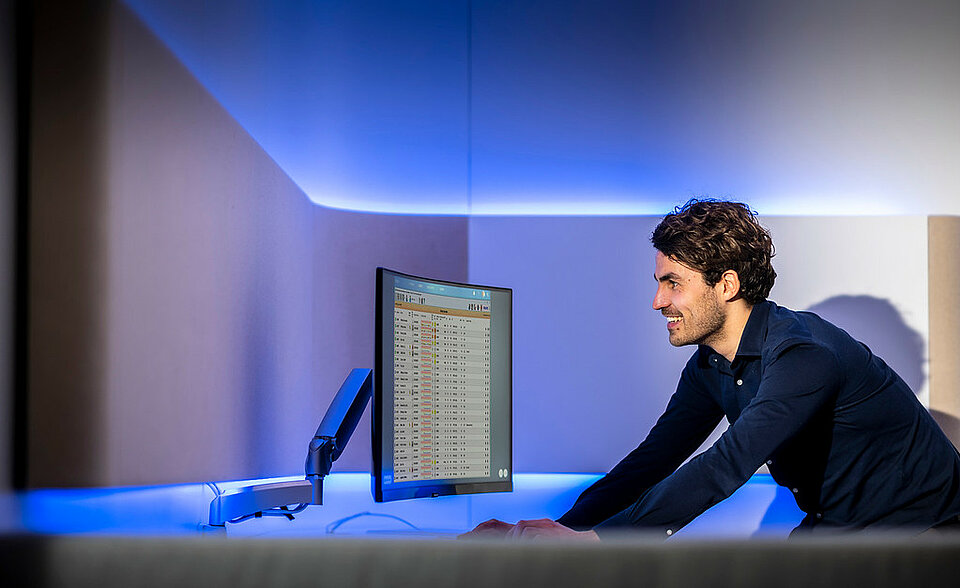Developing healthcare solutions in close collaboration with hospitals
Johannes Andriessen is Senior Manager Connected Care at Philips. In the Benelux market he is responsible for healthcare solutions such as biosensors and monitoring platforms. In developing these solutions, Philips works closely together with hospitals and relevant partners. In this process, the clinical question is leading. The healthdot, a sensor that monitors patients inside and outside hospital walls, is a good example of this.

“In September 2017, I started a three-year Management Traineeship at Philips,” says Johannes. “The purpose of the Philips traineeship is that you fulfill three different roles during that period so that you get to know the diversity of the organization and the multitude of possibilities. I started with a first assignment at Philips University, Philips’ global Learning & Development department. A role that did not directly match my background, but was enormously enriching because it made me get out of my comfort zone and enabled me to get to a sound understanding of the company as a whole.”
Conscious choice for direct contact with customers
“As a result, for my second assignment I consciously chose an assignment in the Benelux market organization. That way I was able to experience how Philips adds value to its end users; hospitals and patients first-hand. That is how I got a position in the Connected Care team of the Benelux market, where I worked as a Business Developer for a year. In this role I contributed to propositions for our Biosensors and the IntelliVue Guardian platform. A solution that enables medical staff to detect deterioration in patients at an early stage while reducing the administrative burden for nurses. ”
Shift in healthcare focus due to corona
“After a year in the Benelux sales organization, I wanted to gain experience in one of the Philips Business Groups. These are the departments where our solutions are continuously developed in order to continue to respond to the wishes of our customers worldwide. I was about to start at emergency care, which focuses on defibrillators, among other things, and would visit customers worldwide to learn more about their challenges and wishes. Because of COVID-19, these customer visits were canceled and, moreover, the focus in healthcare shifted.


Large increase in demand for Connected Care
“The demand for monitoring solutions increased enormously due to the pandemic, also in the Benelux market, and my manager from my second role asked if I could help out. That is what I did and within no time I was working fulltime for my previous team. After my traineeship ended in September of last year, I stayed with the team. I then became Senior Manager Connected Care and in that role I am responsible for our solutions that are used for monitoring patients in nursing departments in the Benelux market.”
Digitization and e-health gaining momentum due to health crisis
“The pressure on hospitals was and is enormous due to corona. This pressure has partly contributed to the acceleration of innovation and digitization in hospitals. Many hospitals have used our Guardian platform, in combination with our Biosensors, to enable remote monitoring. By monitoring the patient remotely, the nursing staff does not have to enter the isolation room as often and you increase the frequency of measurements at the same time. ”
Develop joint solutions based on the questions and challenges hospitals and patients
“The development of the healthdot, a sensor with which patients can be monitored within the walls of the hospital but also after their discharge, has also been realized at an accelerated pace in view of the pandemic. At Philips, we develop solutions based on customer demand. We start from the clinical question and, together with healthcare institutes, map out the pain points and how we can solve them together. The healthdot, which was developed in collaboration with the Catharina hospital in Eindhoven and the Holst Centre research institute, is a good example of this. It originated from a structural regional partnership in Brainport Eindhoven called e / MTIC (Eindhoven MedTech Innovation Center). Philips, TU / e and three top clinical care organizations in the region - Maxima Medical Center, Catharina Hospital and Kempenhaeghe - work together in this. The healthdot currently only works on KPN's LoRa network, but is being developed further so that it is also suitable for 4G / 5G, so that it can also be used outside the Netherlands.”
Important for me to believe in the purpose of my employer
“Of course I already knew Philips by name before I started working there, but through a guest lecture during my master Business Innovation Management at Erasmus University I got to know Philips and its strategy better. It is a health company that wants to improve healthcare through close collaboration with hospitals, technology, and data. I believe in that. I find a number of elements in my work very important, but the most important thing for me is that I agree with the direction, vision and purpose of the company I work for. I really believe in the development of virtual care centers. Care centers where patients are monitored remotely. "
Dynamics, variety and possibilities for personal development
“In my role, you don't necessarily have to be very technical, but you do have to have an affinity with technology and be able to find your way in technology. There is hardly any solution that Philips is working on that does not have a platform component. If you have an affinity with technology and care, you can do all you want to do here. What I like about my current job is the dynamics and the speed and variety in contacts with the team, hospitals, stakeholders and channel managers. You can put a lot of creativity into it. Just like in the creation of new business models. The combination of technology and stakeholder management and the ability to develop yourself, as a specialist or as a generalist. At Philips everything is possible. ”